Text
Natalie Hales - Reading Response 8
I felt that this reading was the most important and applicable one of the quarter. We absolutely do live in a world that is mediated by images, and these images define what we should consider as truth in our society. The “spectacle” that Debord describes promotes a capitalist agenda; telling us that we should place our desires before our needs.
While reading this text, I felt myself drawing connections into classes that I have taken for my sociology minor. In these, we heavilily discuss the images that we everyday, what they mean, what ideas they are promoting, and who is promoting them. Debord helps to further this discussion; most of what we do, see and think is mediated by the spectacle. In other words, we are controlled by capitalism.
I very much appreciated the solutions that Debord offered, I really don’t like it when an author presents a huge problem with little to no input on how to go about fixing it. I thought that dérives were interesting, but also very hard to achieve in today’s world. Détournements, however, I loved. I want to see more artwork out there like that, absolutely. Maybe I’ll get on that.
0 notes
Photo






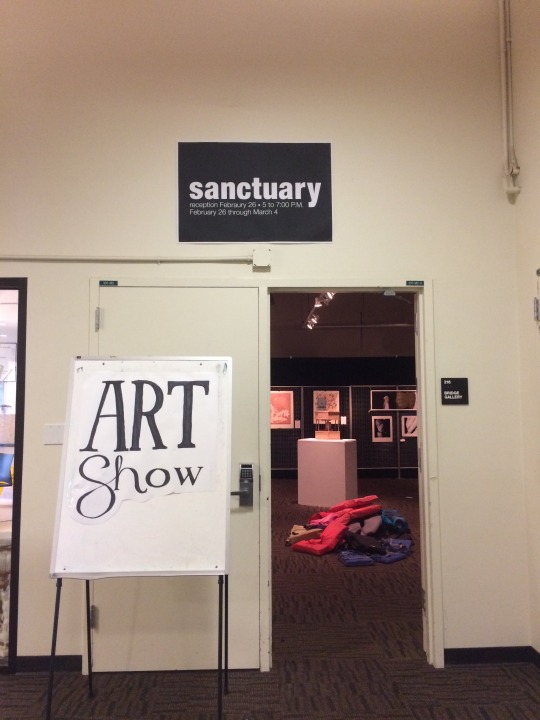

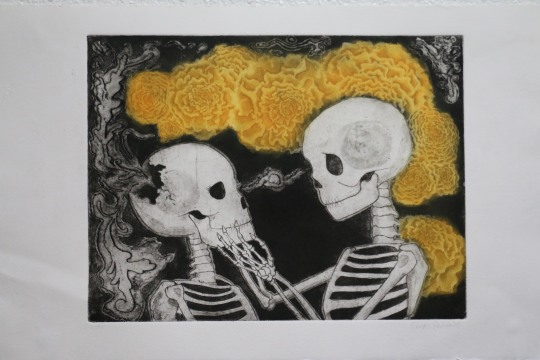
Since the print quality of the publication was not the best, I thought I should upload the documentation photos here as well.
I had a solo exhibition featuring four of my intaglio prints in the mini-gallery in the Art Department quad from February 4-11, 2016.
I was also a participant in the group show “Sanctuary” put on by Rachel Smith that was held in the Porter Bridge Gallery from February 26 to March 4.
0 notes
Photo
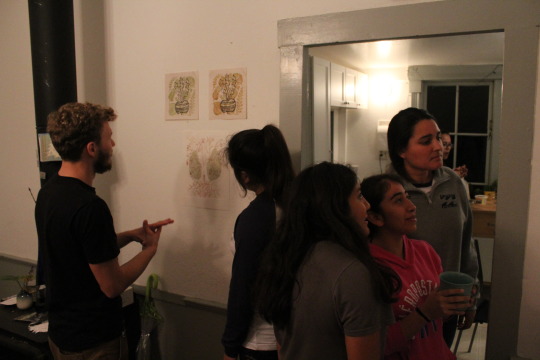
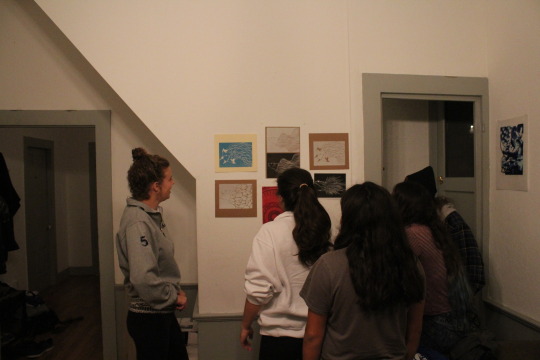

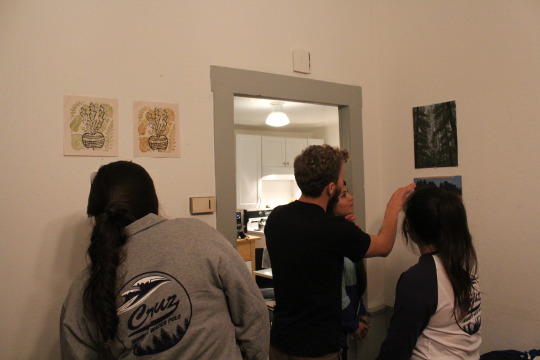
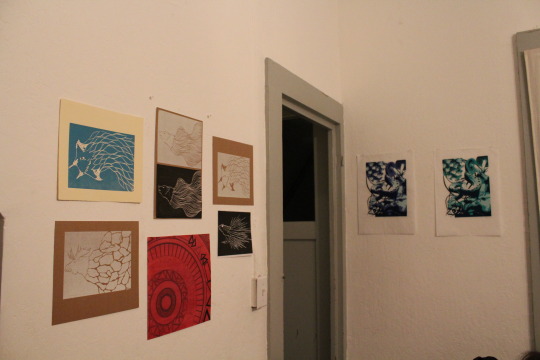

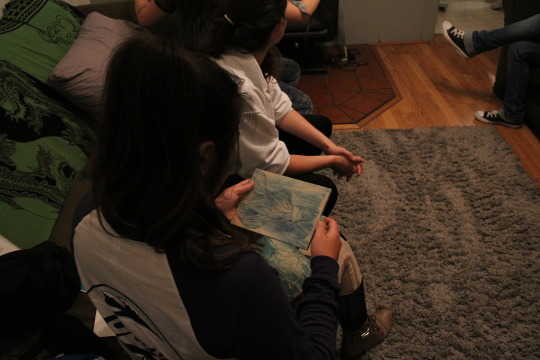


Emma Formato Exhibition
I did a solo exhibition at my house on March 4 that was focused on my animal series prints, but also showed some additional prints and photographs>
0 notes
Text
reading response 8 - rosa gonzales Guy mentions the spectacle is a means of unifying society because it is itself, society. Except a spectacle within society stands out in my opinion. If you see someone running around the street screaming and wearing all pink, thats a spectacle. It's something that stops you in your tracks and makes you look but you don't tell that person to stop. Society as a whole seems scared of spectacles. Not a lot of people want to stand out in a crowd and shy away from the norm so the idea of them being unified is foreign to me. I think this ties into his mentioning if capitalism because if big corporations were considered a spectacle the way I see spectacles, then you'd look over but wouldn't do anything about it.
0 notes
Text
Frankie Quiroz Critical Reading Response to Debord
This piece was both interesting and confusing at times. There were mentions of cycles and the continuation of ideals across generations. I also felt this could’ve been condensed a little bit like the cycle of ideals’ birth and death continue through generations where they are interpreted differently affects how people interpret success with todays notions of consumerism and capitalism.
0 notes
Text
Christina G. Chen - Reading Response 8
As I am reading throughout the article “The Society of the Spectacle”, Guy Debord has a way of drawing me in with description of what spectacle means to him but at the same time I also get lost in what he’s trying to say. I agree with one of the other student’s responses how it would be great if there are examples as to what he intends for us to understand about spectacle in society. On the other hand, I really enjoyed his interpretation on time and how individual lives are not historical and are quickly forgotten since “spectacle’s pulsing machinery replaces one by the next.”
0 notes
Text
Reading Response 8- Breezy Simpson

0 notes
Text
Jocelyn Lozano RR8
The way Debord formulates his thoughts makes it very difficult for me to understand what he is truly saying. That being said, I really liked his reference to the contextualization of images-- that once images are removed from where they once where, their unity is ruined. He says that “The spectacle is not a collection of images; rather, it is a social relationship between people that is mediated by images” soon after. This reinforces my assumption that he is talking about contextualization – because a social relationship cannot be decontextualized – the idea is mediated by images, but isn’t solely a collection of images (which are not as important to decontextualize. This makes me think of a conceptual piece about an important topic versus still life drawings that are meant to focus on the form rather than the idea). I will be adding more to this response after class when I understand it more.
0 notes
Text
Nicholas Ewing - Reading Response 8
RR8 Guy Debord’s piece “The Society of the Spectacle” is an interesting mishmash of thoughts that attempts to address a self fulfilling prophecy of ideals. The idea is something along the lines of: ideals are put forward and promoted, the people try to achieve the fiction and the fiction is again propagated by the next generation. Round and round it goes, where it stops nobody knows! Which by is coincidence how this piece made me feel.
Does it have relevance to contemporary society? No doubt.
0 notes
Text
Kristi McMahon RR8 Guy Debord
While reading Debord’s The Society of the Spectacle, I felt a bit like I was being tumbled in a clothes dryer. I felt a bit like everything was just going round and round. Not sure if that was because the words “Society” and “Spectacle” were used so much throughout the piece, but definitely left me spinning. With that said, I feel like much of the piece could stand to be true today. Our society is driven by what it is fed, and we are fed this ideal and that we should all work to achieve the ideal. The thought how consumer driven our society is drives me crazy. I wish that I could raise my children without the over abundance of the ideal that is advertised. Everywhere we turn something or someone is trying to sway us to buy their product or change who we are to conform to the ideal. Ultimately we are left trying to figure out what is real or not when compared to the ideal that is being advertised.
0 notes
Text
Jack Wolcott’s Reading response
As I was reading over some of my other classmate’s responses from this article I noticed some folx talking about the vagueness of what the “spectacle” means. I actually think it’s really important for the argument that it is left so vaguely. The key argument in this article is the way he lists the functions / reproductions of the spectacle in its relation to others. The most powerful part of this essay for me is “to analyze the spectacle means talking its language to some degree -- to the degree, in fact, that we are obliged to engage the methodology of the society to which the spectacle gives expression.” The spectacle is everything that exists under our society. “For what the spectacle expresses is the total practice of one particular economic and social formation; it is, so to speak, that formation's agenda. It is also the historical moment by which we happen to be governed.” I really enjoyed this reading and how “theory” heavy it is. I found that it creates some what of an important tone and thus I take it more seriously. I think I have the book somewhere in my house and will probably read the rest of it.
0 notes
Text
Irene Valencia-Reading Response 8
Debord makes interesting claims especially in regards to consumerism governing our lives, yet society makes no efforts to change materialistic ideologies. Perhaps we’ve become accustomed to exploitation of ourselves and of others that we cannot fathom the notion of even opposing the “natural” order. Debord uses the spectacle as an example of both power and subjects to that power; allowing ourselves to conform to “rules” of society in order to maintain a controlled structure. I agree with many of his points but I do wonder how this pertains to art. Maybe he’s suggesting that art is not subject to dominant culture. Many art forms have earned a reputation for being “radical” or “controversial” or even “against” mainstream beliefs. Art is one of the few subjects dedicated to publically represent the flaws in our society, such as the effects of capitalism, or anything that needs immediate attention. On the other hand, Debord could be saying that art is nothing but a form of production only produced for aesthetic reasons and made for the wealthy. It would have been helpful if Debord gave examples to support his intentions but maybe it’s his intention for readers to create their own perspectives that way we are not relying solely on his biases.
0 notes
Text
Jasmine Warner’s Guy Debord Reading Response (RR8)
Debords begins this article by presenting his ideas about spectacles in a similar way to Barthes idea that mythologies can be interpreted from everyday events. Debord also presents his findings in a similar way to Barthes as well as the artist manifestos from the previous week by creating a list of numbered paragraphs to convey his message. His segment on spectacle also mimics the artist manifestos by stating the who, what, where, why, how, and when his idea of the spectacle embodies. Although each segment reflects on a similar topic the way of presenting the topic does not always flow. One gap is the correlation of how Debord talks about spectacle in his first segment than in the latter, which starts analyzing it in Marxist terms. This latter half is like Greenberg’s article because the author no longer seems focused on defining the spectacle itself but how and why it relates to Marxist philosophy.
0 notes
Text
Reading Response - Guy Dubord
While I understand from the historical context of this piece what Dubord is talking about, it is difficult to follow and is very nebulous and vague. I wish that he were to give some concrete examples so that the reader could know more about what he means as a spectacle and how it functions in society as he sees it. He is very vague and isn’t quite convincing enough for me to fully see what he is talking about in this long list of many theses. For instance, “The spectacle, being the reigning social organization of a paralyzed history, of a paralyzed memory, of an abandonment of any history founded in historical time, is in effect a false consciousness of time.” That is just a super grand, vague, generalizing statement that doesnt really mean anything. I look forward to seeing if Tra can shed any light on this. Because I understand the Situationists I just dont quite grasp everything Dubord is saying in the Society of the Spectacle. Perhaps I am too corrupted by the specticle.
0 notes
Text
Matt Beach-Debord Reading Response
Debord spends the first page or so describing what constitutes a “spectacle” in his eyes. This term doesn’t really make a lot of sense to me. As I read this, I found it hard to link the numbered points together into something tangible. Debord then goes on to explain how the “spectacle” functions in society. As far as I can understand, the spectacle is around to protect us and keep society from crumbling. To be honest, most of this essay was way above my head, and I know for a fact that I’m going to need lecture to help me grasp this. The fact that Debord uses the second third of this series of point to start delving into time? Hardcore lost me there, bud. I’m guessing that this essay is in some way an art piece? I can’t think of any other reason as to why it would be broken in this way, because it doesn’t seem like a manifesto, and it’s not really listing anything? The third act is titled “Environmental Planning” and starts off with a Machiavelli quote, so I know for sure this is gonna be a tough one to figure out. It talks a lot about this term called “Urbanism” and how it relates to capitalism. I have a limited scope when it comes to city planning, in that I really only know the stuff my environmental studies major girlfriend has told me about the subject, which has to do with sustainable building so I’m not very well equipped to grasp much of this.
0 notes
Text
Elexis Padron, Response to Debord
While I was reading this, I forgot that it was for my Writing for Artists class and began to think that it was for my Community Studies class! Although I definitely understand how the general concept of “the spectacle” as I understand it (or, how I understood it before reading this article) relates to art, I have a hard time making the same connection with the way that Debord talks about “the spectacle.” He talks about the spectacle as a model of social life and as a model of economic development; while also arguing that the latter has taken control of the former. He talks about the spectacle as the “opposite of dialogue,” “the self-portrait of power in the age of power’s totalitarian rule over the conditions of existence,” as the production of commodities, as the main vehicle for separation and isolation that leads to the proletarianization of the masses, and a docile one at that. He asserts that it is a means of social control and for justifying the status quo as it preserves unconsciousness. The spectacle is in control of our lives; it is what governs us. While I do agree with essentially all of the points Debord makes, I have a hard time relating it to art. This is probably because I see all of Debord’s arguments as being negative in nature, and as the spectacle as something harmful and even destructive, whereas I tend to see art as the complete opposite. Although I can understand the argument for art as a means of social control, I do not want to see it that way. I see art as a space for individual expression and interpretation, where individuals have the autonomy to take what meaning they want and transform a piece in their own mind. Then again, if you go by Claus Oldenburg’s logic and say that everything is art, then the commodities and such related to the spectacle can fall under the category of art, and in that sense the arguments could work, but I think that is a stretch. In a broader sense though, I think Debord’s article is meant to stir consciousness so that people can push back against the spectacle and reclaim our appropriated history. It serves to awaken us to the reality of the false consciousness we are being pushed to live in.
0 notes
Photo


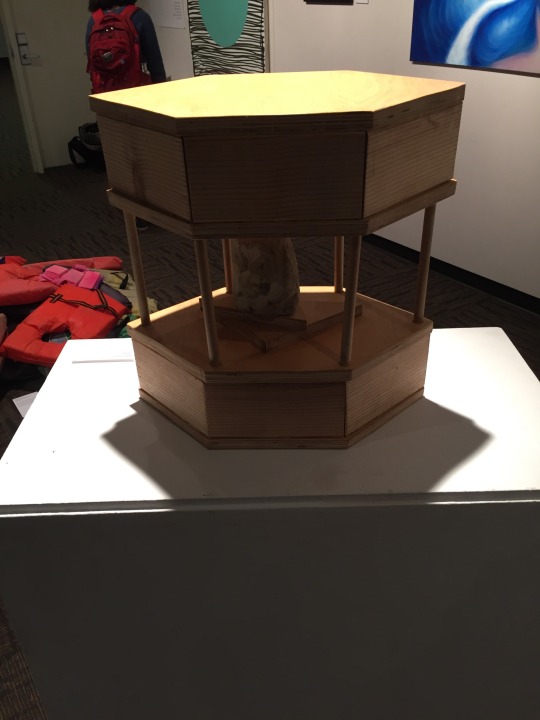
My artwork is currently being shown in a group exhibition titled Sanctuary at the Bridge Gallery in Porter College. I haven’t done a full coverage of this show yet, but I did take these photos of my piece, titled Plateau. My original plan was to do a group show at West Cliff with other transfers, but I was approached by Rachel Smith during our sculpture class and she told some of us that she wanted to do this group exhibition. After reading the prompt that was eventually sent out to the rest of the department, I decided to enter this piece. I plan to ask a friend of mine to borrow his camera and tripod so I can better document this work. As it is currently, I am pleased with the presentation and lighting. I did not have any takeaways for this exhibition, but I might leave my artist website and some kind of email to reach me at before the exhibition closes on the 5th. As of right now, I’ve only let my friends know that I am showing work.
1 note
·
View note